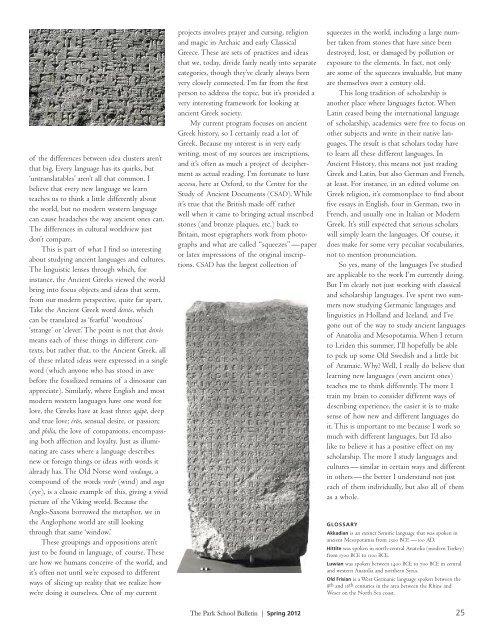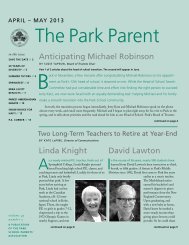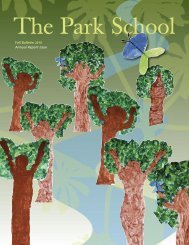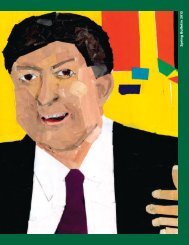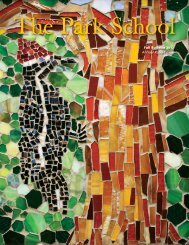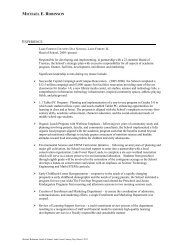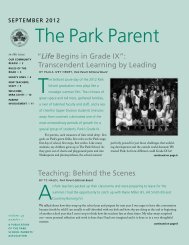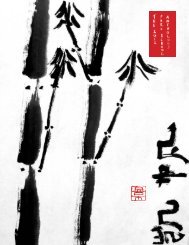Spring Bulletin 2012 - The Park School
Spring Bulletin 2012 - The Park School
Spring Bulletin 2012 - The Park School
Create successful ePaper yourself
Turn your PDF publications into a flip-book with our unique Google optimized e-Paper software.
of the differences between idea clusters aren’t<br />
that big. Every language has its quirks, but<br />
‘untranslatables’ aren’t all that common. I<br />
believe that every new language we learn<br />
teaches us to think a little differently about<br />
the world, but no modern western language<br />
can cause headaches the way ancient ones can.<br />
<strong>The</strong> differences in cultural worldview just<br />
don’t compare.<br />
This is part of what I find so interesting<br />
about studying ancient languages and cultures.<br />
<strong>The</strong> linguistic lenses through which, for<br />
instance, the Ancient Greeks viewed the world<br />
bring into focus objects and ideas that seem,<br />
from our modern perspective, quite far apart.<br />
Take the Ancient Greek word deinós, which<br />
can be translated as ‘fearful’ ‘wondrous’<br />
‘strange’ or ‘clever.’ <strong>The</strong> point is not that deinós<br />
means each of these things in different contexts,<br />
but rather that, to the Ancient Greek, all<br />
of these related ideas were expressed in a single<br />
word (which anyone who has stood in awe<br />
before the fossilized remains of a dinosaur can<br />
appreciate). Similarly, where English and most<br />
modern western languages have one word for<br />
love, the Greeks have at least three: agápē, deep<br />
and true love; érōs, sensual desire, or passion;<br />
and philía, the love of companions, encompassing<br />
both affection and loyalty. Just as illuminating<br />
are cases where a language describes<br />
new or foreign things or ideas with words it<br />
already has. <strong>The</strong> Old Norse word vindauga, a<br />
compound of the words vindr (wind) and auga<br />
(eye), is a classic example of this, giving a vivid<br />
picture of the Viking world. Because the<br />
Anglo-Saxons borrowed the metaphor, we in<br />
the Anglophone world are still looking<br />
through that same ‘window.’<br />
<strong>The</strong>se groupings and oppositions aren’t<br />
just to be found in language, of course. <strong>The</strong>se<br />
are how we humans conceive of the world, and<br />
it’s often not until we’re exposed to different<br />
ways of slicing up reality that we realize how<br />
we’re doing it ourselves. One of my current<br />
projects involves prayer and cursing, religion<br />
and magic in Archaic and early Classical<br />
Greece. <strong>The</strong>se are sets of practices and ideas<br />
that we, today, divide fairly neatly into separate<br />
categories, though they’ve clearly always been<br />
very closely connected. I’m far from the first<br />
person to address the topic, but it’s provided a<br />
very interesting framework for looking at<br />
ancient Greek society.<br />
My current program focuses on ancient<br />
Greek history, so I certainly read a lot of<br />
Greek. Because my interest is in very early<br />
writing, most of my sources are inscriptions,<br />
and it’s often as much a project of decipherment<br />
as actual reading. I’m fortunate to have<br />
access, here at Oxford, to the Centre for the<br />
Study of Ancient Documents (CSAD). While<br />
it’s true that the British made off rather<br />
well when it came to bringing actual inscribed<br />
stones (and bronze plaques, etc.) back to<br />
Britain, most epigraphers work from photographs<br />
and what are called “squeezes” — paper<br />
or latex impressions of the original inscriptions.<br />
CSAD has the largest collection of<br />
squeezes in the world, including a large number<br />
taken from stones that have since been<br />
destroyed, lost, or damaged by pollution or<br />
exposure to the elements. In fact, not only<br />
are some of the squeezes invaluable, but many<br />
are themselves over a century old.<br />
This long tradition of scholarship is<br />
another place where languages factor. When<br />
Latin ceased being the international language<br />
of scholarship, academics were free to focus on<br />
other subjects and write in their native languages.<br />
<strong>The</strong> result is that scholars today have<br />
to learn all these different languages. In<br />
Ancient History, this means not just reading<br />
Greek and Latin, but also German and French,<br />
at least. For instance, in an edited volume on<br />
Greek religion, it’s commonplace to find about<br />
five essays in English, four in German, two in<br />
French, and usually one in Italian or Modern<br />
Greek. It’s still expected that serious scholars<br />
will simply learn the languages. Of course, it<br />
does make for some very peculiar vocabularies,<br />
not to mention pronunciation.<br />
So yes, many of the languages I’ve studied<br />
are applicable to the work I’m currently doing.<br />
But I’m clearly not just working with classical<br />
and scholarship languages. I’ve spent two summers<br />
now studying Germanic languages and<br />
linguistics in Holland and Iceland, and I’ve<br />
gone out of the way to study ancient languages<br />
of Anatolia and Mesopotamia. When I return<br />
to Leiden this summer, I’ll hopefully be able<br />
to pick up some Old Swedish and a little bit<br />
of Aramaic. Why? Well, I really do believe that<br />
learning new languages (even ancient ones)<br />
teaches me to think differently. <strong>The</strong> more I<br />
train my brain to consider different ways of<br />
describing experience, the easier it is to make<br />
sense of how new and different languages do<br />
it. This is important to me because I work so<br />
much with different languages, but I’d also<br />
like to believe it has a positive effect on my<br />
scholarship. <strong>The</strong> more I study languages and<br />
cultures — similar in certain ways and different<br />
in others—the better I understand not just<br />
each of them individually, but also all of them<br />
as a whole.<br />
GLOSSARY<br />
Akkadian is an extinct Semitic language that was spoken in<br />
ancient Mesopotamia from 2500 BCE — 100 AD.<br />
Hittite was spoken in north-central Anatolia (modern Turkey)<br />
from 1700 BCE to 1100 BCE.<br />
Luwian was spoken between 1400 BCE to 700 BCE in central<br />
and western Anatolia and northern Syria.<br />
Old Frisian is a West Germanic language spoken between the<br />
8th and 16th centuries in the area between the Rhine and<br />
Weser on the North Sea coast.<br />
<strong>The</strong> <strong>Park</strong> <strong>School</strong> <strong>Bulletin</strong> | <strong>Spring</strong> <strong>2012</strong> 25


